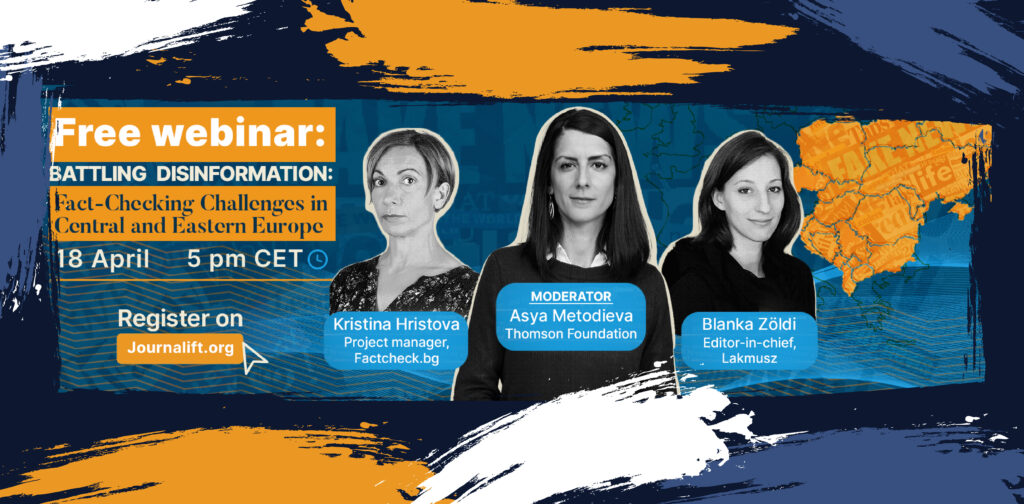From June until November 2023 Thomson Foundation ran Female journalists’ internship stream in five Central European countries. Kata Tihanyi, a young female journalist, was one of the interns on this programme in Veszprém-Kukac (Hungary). During her internship, Kata did a series of interviews with people who work in fields that are usually not related to their gender. She interviewed a female reintegration officer, a female football player, a female goldsmith and a male nail technician.
In the course of her assignments, Kata visited Veszprém prison, and spoke to Márta Baán-Muzsik, a dedicated reintegration officer. For most of us, the world behind bars is quite unknown, and Kata’s interview serves as a window into an often overlooked and stereotyped realm of correctional facilities. Tasked with unravelling the layers of prison life, her story provides a deeper understanding of the challenges, triumphs and gender dynamics within the Veszprém prison.
Read the full interview below, as well as Kata’s experience visiting the prison.
On the other side of the prison bars – I can see the pain in the eyes

„Alone in the dark with nothing but your thoughts, time can draw out like a blade.” - is the famous line from the brilliant film, The Shawshank Redemption. We have at best a vague idea of the loneliness prison inmates can feel. It must be a cold, unfriendly, grimly hopeless feeling to live in an overregulated institution.
On a usual Saturday, I received a call from my editor-in-chief saying that I had the opportunity to interview the reintegration officer, Márta Baán-Muzsik in the prison of Veszprém. I knew I had to pull up my socks. Not only because interviewing is a difficult genre, but also because I didn't know what to expect.
I can confirm that when a greenhorn journalist is asked to go to prison to do an interview, the first natural reaction is to panic. What do we know about prisons? People who have been struck down by the justice system, and have committed a crime, are put there. It may be serious or not so serious, but one thing is certain: we always think about the worst. We immediately think of murderers on the other side of the bars. After some research, I had to dispel this stereotype, because the institute in Veszprém is not a penitentiary, but a detention centre, which means that the prisoners have not yet been sentenced.
My interviewee works as a reintegration officer, and I wanted to have a discussion with her about the unusual career choice and the difficulties she faces. I found out that her job is to help prisoners get over the initial shock of being admitted, and then to explain the rules of the institution and its opportunities for self-development. It is perhaps not surprising that this position is also filled by women, as women often work in areas where emotions and mental processes are in focus. There are many male reintegration officers working in prisons, but I was genuinely interested to see what this harsh environment is like through the lens of a woman.
I was standing at the prison gate with a well-thought-out set of questions. From the outside, the building looked very unfriendly. I had been standing there for some time when a male voice on the intercom told me that he was opening the gate, and I should go in. I was walking through a long yard looking around, obviously not being a regular visitor.
It's not easy to get inside the prison, we spent several weeks on the phone and correspondence before we got permission for the interview. I had to register my personal information and type of equipment beforehand. Once there, I presented my ID and waited, a little anxiously, to be allowed in. I breathed a sigh of relief when my interviewee arrived, and we were told that we could go inside.
Prison also has its own smell. I wouldn't say it smells bad at all, it's more like a typical scent, like in a hospital. We were just walking down the corridors and I thought I wasn't going to see any prisoners when we stopped in front of a door. My interviewee warned me not to be frightened by the stares, and that I should simply ignore them. I could see that she had experience in the matter, but I was still nervous.
The interview took place in a small office of the prison. Márta Baán-Muzsik got me over the initial shock quickly, and I found myself listening to her answers, putting aside my list of questions. As a beginner journalist, we usually clutch the paper with the questions and think of the next one while our interviewee is answering them. However, the reintegration officer's reassuring voice and personality had a very positive effect on me. For a moment I forgot that I was still a rookie and could put aside my pre-written questions.
Márta Baán-Muzsik graduated as a sociologist and wanted to work with disadvantaged groups. She has been working in the prison service for ten years, previously as a probation officer and currently as a reintegration officer. We are talking about her job in a somewhat bizarre environment, the prison of Veszprém.

What exactly is your job and what are its responsibilities?
I work as a reintegration officer in the prison service. It used to be called educating, but now this is the official title. My job is to look after the prisoners in my area. From the moment the prisoners enter the prison, I help them to integrate, develop their relationships and explain the rules of the house. For those who come in for the first time, it's obviously a very new, unfamiliar environment. I try to help them through this shock.
What is the hardest part of your job and what do you like most about it?
I have to face very difficult fates and it is stressful. What I really like is that I always have little stories of success. I'm happy when I manage to get someone through the initial shock or develop a relationship with their family, because it's a big help for them too. In this particular environment, you have to get used to captivity, which is very difficult for many people, and I can see the pain in their eyes and how they are struggling. What I like most about my job is that I can help them get through it.
What opportunities do prisoners have within the reintegration project?
Personal development, labour market counselling, education and the opportunity to get a profession. Our hope is that they will acquire the competences that will help them to find their place in society. Some prisoners have got a profession here or are finishing school here. They are valued for their work, they keep themselves busy and they have some kind of income.
Is there any advantage to being a woman in this profession?
Among my colleagues, I don't feel any advantage or disadvantage of being a woman. We work with our personalities. I am not a woman here when I walk down the corridors, I am the reintegration officer. I see the person in them, and I think it's mutual. They give me respect and I approach them as human beings. Of course, sometimes I get comments from the inmates, but I always try to exclude the woman from this relationship, if you can even call it a relationship. I try to create a communication situation where there are two adults, not a man and a woman.
What is the gender ratio between workers and prisoners and which gender do you find easier to work with?
There are many more men among our staff, but it is not uncommon to have a female colleague. It is a very masculine world, I might add. It's definitely only for those who can follow the rules, because they are on both sides of the bars. As for prisoners, there are more men. The prison has a capacity of five hundred and there are about 100 women inmates. At the moment I work with men, but I also have experience with women. I think it is a bit more stressful with women. A lot of them are mothers, wives, grandmothers, and the lack of family is more intense for them than for men. Women also have more fights, men are perhaps a little more disciplined.
Are there any national or international statistics on how this reintegration project is working?
We have a very difficult job. The reintegration officers have a job as long as the detainee is in prison, we do not follow up. If someone is released from prison and is placed under probation supervision, the probation officers follow their life from then on, so that information about their integration and their life can come back to us through them. We can't even keep in touch with prisoners who have been released. Sometimes we get a thank you letter, but we don't have much information about what's happening with them outside.
There are a lot of preconceptions about prisons, that they are too comfortable, almost hotel-like, or that prisoners don't have to work. What do you think about this? Do you think the rules should be made easier or stricter?
When a sentence is handed down in a court of law, no one is satisfied. The offender thinks it's too much, the victim thinks it's too little. Obviously, for the person who gets in or for their family members, it's too strict, over-regulated, unfair and a harsh place. But the victim's family sees it as a hotel. We prepare the inmates to go back into society. They can get an education here, they can get opportunities that they would have to pay for on the outside, so from this perspective it can really be seen as a hotel. There will always be crime, unfortunately. People who commit crimes go to prison, but we must remember that they will get back in our society. We help them to live a decent life. The conditions and opportunities are there to make it easier for them to re-enter society.
Was there a person who was close to you or someone whose story moved you?
I try to keep my distance. Partly because of expectations, but also because you shouldn't get involved. It's in our own interest because you spend a lot of years here and it can be very challenging. Everyone tries to exclude personal contact. Because of my own mental state, I treat prison as a place of work, even if it is my vocation. I must put these burdens down at the gate when I go home, - concludes Márta Baán-Muzsik.
Márta Baán-Muzsik shed light on the side of the prison that most people don't know. However, when I headed for the exit, I was still walking faster than on my way in. I was relieved when the gate opened on my first attempt, and I left the building behind. It was good to see the humane side of the prison. I can now see more clearly that the institution itself does not punish prisoners but tries to help them to reintegrate smoothly into society after their release. What punishes the prisoner is loneliness and time.

Kata Rebeka Tihanyi holds a bachelor's degree in Communication and Media Studies and completed a one-year postgraduate course in Marketing. Currently in the final year of a Master's in International Studies, she discovered a passion for writing and information exploration, fueled by love for reading. As a beginner in the field of journalism, she joined Thomson Foundation internship in June and spent a full four months on the programme.































